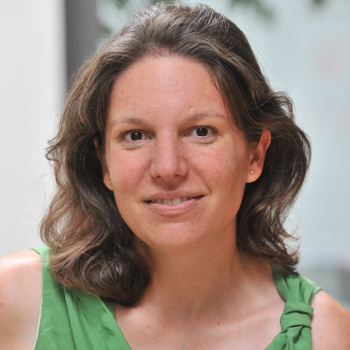Using sewage waste water for hydroponics
Martina WinkerProfession
PhD in Agricultural Sciences
Position:
Head of the research unit Water Infrastructure and Risk Analyses at ISOE in Frankfurt/am Main

Profession
PhD in Agricultural Sciences
Position:
Head of the research unit Water Infrastructure and Risk Analyses at ISOE in Frankfurt/am Main

With their project “HypoWave” scientists in Frankfurt, headed by the agricultural expert Martina Winker, aim to re-purpose municipal sewage waste water for hydroponic plant breeding programmes by filtering out the nutrients while simultaneously minimising water usage in agriculture.
On their quest for ways to save water during farming, researchers are focussing more and more on sewage treatment plants. Within the cooperation project “HypoWave” Frankfurt-based researchers headed by the agricultural expert Martina Winker aim to develop a new method in order to use municipal sewage water more effectively for farming plants. Therefore, they are focussing on hydroponics. Hydroponics describes a way of growing plants, where they don’t require soil but derive necessary nutrients from a solution. A pilot plant will be build next to a sewage plant in Wolfsburg in order to analyse if and how hydroponic plant breeding schemes can benefit from repurposed sewage water. The project is funded by the federal ministry for research and education (BMBF) with a total of €2.1 million.
The project “HypoWave“ focuses on repurposing of sewage water in order to minimise water usage in agriculture. Why is sewage water so much more sustainable?
The sustainability of hydroponic systems is based on several facts: On the one hand it requires significantly less water and ground than conventional farming. On the other hand it allows for the immediate turn-around and re-use of nutrients such as nitrogen, phosphate, and potassium, as well as micro nutrients that are present in sewage water and are needed by plants to grow.
What is the aim of the cooperation?
Until now there are now established systems that would fuel hydroponic farms with specifically purified and repurposed sewage water. This is a new innovation. The collective goal of all of the twelve cooperation partners within “HypoWave” is to test this innovative concept on a pilot-base. Subsequently, we want to adapt the market potential for this innovation by analysing the institutional context, case studies in other areas, and the efficiency of such treatment plants.
Hydroponic is already a common way to save water while growing plants. Why did you choose Hydroponics as your experimental area?
Correct, plant production via hydroponic systems is a growth industry, since there are higher yields possible while requiring less ground and water. Therefore this technique is in high demand, given that climate change and droughts are on everyone’s minds. 70% of our water usage is taken up by agriculture. We want to assess, whether we can make plant production via hydroponics more efficient and sustainable by replacing the use of drinking water and using the nutrients of sewage water. An important aspect of this project is also to take a closer look into the relationships between the local water supply system and agriculture. Until now there are hardly any contacts or cooperations. Thus, an important aspect of our research is also to establish and realise these kinds of connections.
How about the taste of cucumbers and tomatoes that are grown with purified sewage water? Does it change their taste?
To predict the flavour of any new product is next to impossible. Since we are still in the early phases of our pilot project, it is mot yet possible for us to comment on the aromatic qualities of these future products. However, in general the plants “don’t care” where they get their nutrients from: in order to provide optimised conditions for the plants to develop their specific aromas, they simply require adequate amounts of water, nutrients, and light – no matter the source.
What are your future tasks?
Right now we are still at the very beginning of the trial period regarding our innovative idea. Currently our project partners are in the midst of establishing the sewage treatment plant in Hattorf. In parallel, we have started the analyses of the institutional context. Throughout this vegetation period we will therefore focus on the pilot analyses, as well as the communication between and with partners from the local water supply system, agriculture, food industry, and the appropriate ministries and departments.
Interview: bb/ jmr


